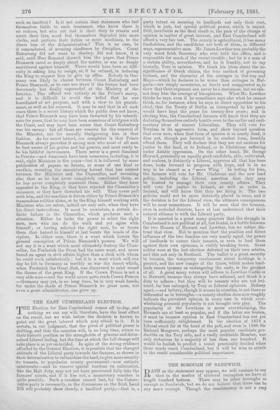THE EAST CUMBERLAND ELECTION.
THE Election for East Cumberland comes off to-day, and nothing we can say will, therefore, have the least effect on the result, but we wish before the decision is known to point out the great interest which may attach to it. It is certain, in our judgment, that the pivot of political power is shifting, and that the counties will, in no long time, return to their historic position as the strongholds of genuine and deter- mined Liberal feeling, but the time at which the full change will take place is as yet undecided. In spite of the strong evidence afforded by the General Election, it is possible that the changed attitude of the Liberal party towards the farmers, as shown in their determination to enfranchise the land, to give more security to tenants, to popularise county government—now entirely aristocratic—and to remove special burdens on cultivation, like the Malt duty, may not yet have penetrated fully into the farmers' minds, and if it has not, a momentary reaction is quite possible. Such a reaction cannot last, for the Conser- vative party is necessarily, as the discussions on the Irish Land Bill will probably show clearly, a landlord party,—that is, a
party intent on securing to landlords not only their rent, which is just, but special political power, which is unjust. Still, inevitable as the final result is, the pace of the change of opinion is matter of great interest, and East Cumberland will afford a very fair test. The county is agricultural, it has many freeholders, and the candidates are both of them, in different ways, representative men. Mr. James Lowther was probably the very worst Irish Secretary who ever held the office, and is responsible for much of the recent trouble ; but he is a man of a certain ability, nevertheless, and he is frankly, not to say bruta]ly, Tory in opinion. We think his ideas about the in- significance of Greek claims, the true method of governing Ireland, and the character of the outrages in Gal way and Mayo—which he declares to be worse than outrages in Bul- garia—are simply monstrous, so heady and exaggerated as.to show that their exponent can never be a statesman, but we can- not deny him the courage of his opinions. What Mr. Lowther thinks he says, even if he sometimes says also what he cannot think, as, for instance, when he says, in direct opposition to his chief, that the Treaty of Berlin as interpreted by his party would have kept the pease for twenty-five years ; and in electing him, the Cumberland farmers will know that they are declaring themselves entirely hostile even to the earlier and rudi- mentary ideas of sincere Liberalism. They will vote for Toryism in its aggressive form, and show beyond question that even now, when that form of opinion is so nearly dead, it does not, though put forward in its crudest form, heartily offend them. They will declare that they are not anxious for justice to the land, or to Ireland, or to Christians suffering under Asiatic oppression. On the other hand, Mr. George Howard, personally an equally good candidate, able, cultivated, and zealous, is distinctly a Liberal, approves all that has been done, looks forward to progress with hope, and. is in no way to be classed as a "mere Whig." In voting for him, the farmers will vote for Mr. Gladstone and the new land policy, including the Liberal assertion that they may be trusted to manage their own county affairs. They will vote for justice to Ireland, as well as order in Ireland, and will know that they are doing it. The two policies could not be more distinctly placed in issue, and if the decision is for the Liberal view, the ultimate consequences will be most momentous. It will be seen that the farmers, even in secluded districts, have at last understood that their natural alliance is with the Liberal party.
It is asserted in a great many quarters that the struggle in Cumberland is not political at all, but feudal, is a battle between the two Houses of Howard and Lowther, but we rather dis- trust that view. Not to mention that the position and direct influence of the two families are very nearly equal, the power of landlords to coerce their tenants, or even to lead them against their own opinions, is visibly breaking down. Great nobles were at the last election defeated on their own estates, and this not only in Scotland. The ballot is a great security to tenants, the temporary carelessness about holdings is a greater, and the new temper of the times, which makes land- lords resent tyranny as endangering the caste, is the greatest of all. A great many voters will adhere to Lowther Castle or to NaWorth because they always have adhered, and think it a duty to adhere ; but they will be tenants who are not irri- tated, far less outraged, by Tory or Liberal opinions. Bribery apart,—and bribery, though it occurs in counties, is not there so influential as in boroughs,---a county election does now roughly indicate the prevalent opinion in every case in which over- whelming personal popularity is not brought into play. The popularity of the Lowthers is never overwhelming, the Howards are at least as popular, and if the latter are beaten, it must be because opinion in East Cumberland has not yet been sufficiently enlightened. In the election of 1874 a Liberal stood far at the head of the poll, and even in 1880 Sir Richard Musgrave, perhaps the most popular candidate pro- ducible on the Tory side, and a really creditable Member, was only victorious by a majority of less than one hundred. It would be foolish to predict a result practically decided when these words reach Cumberland, but it will be wise to attach to the result considerable political importance.


































 Previous page
Previous page